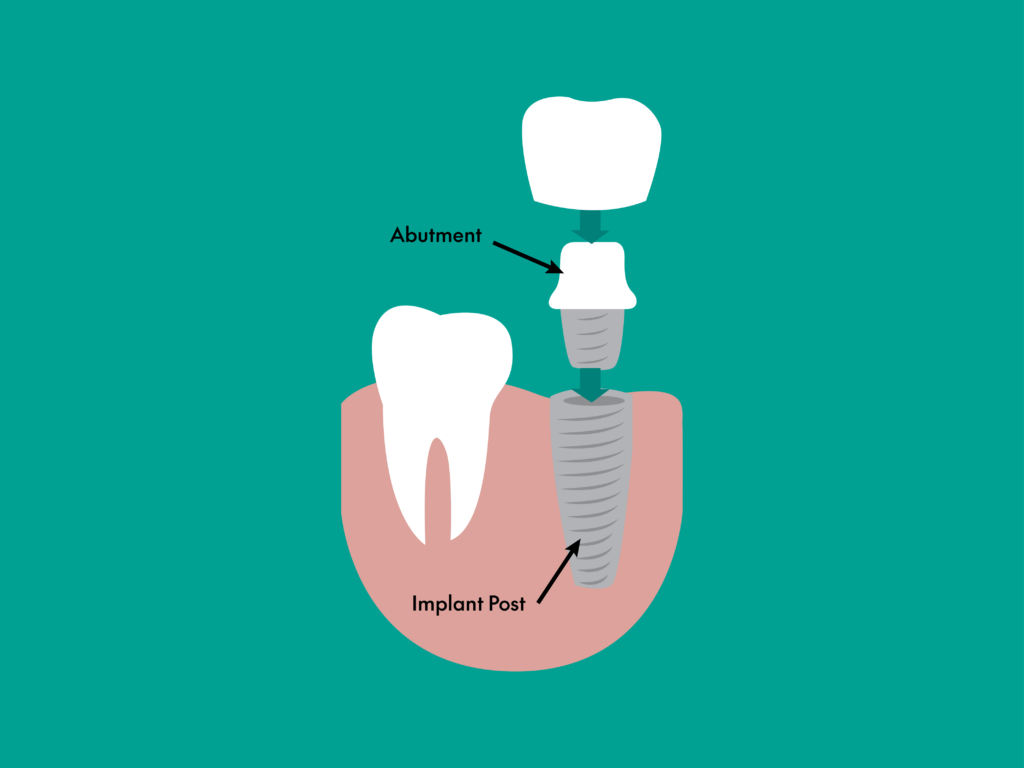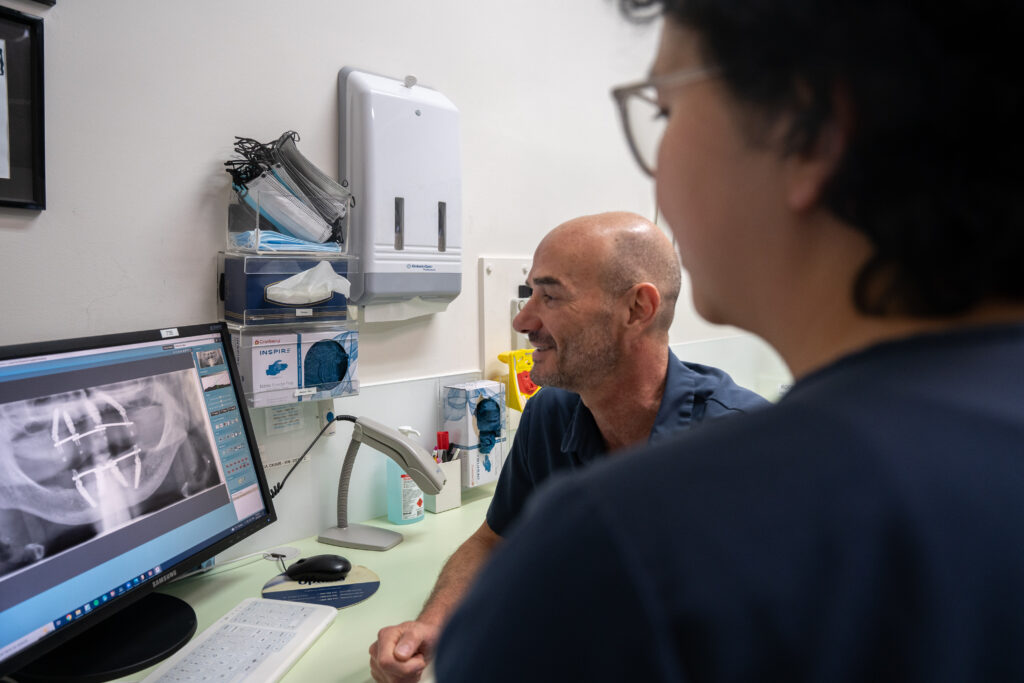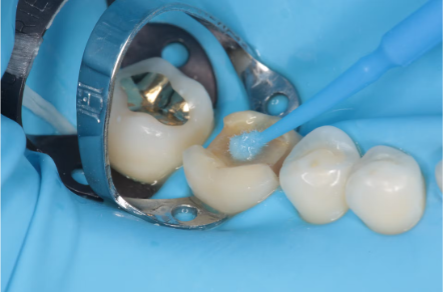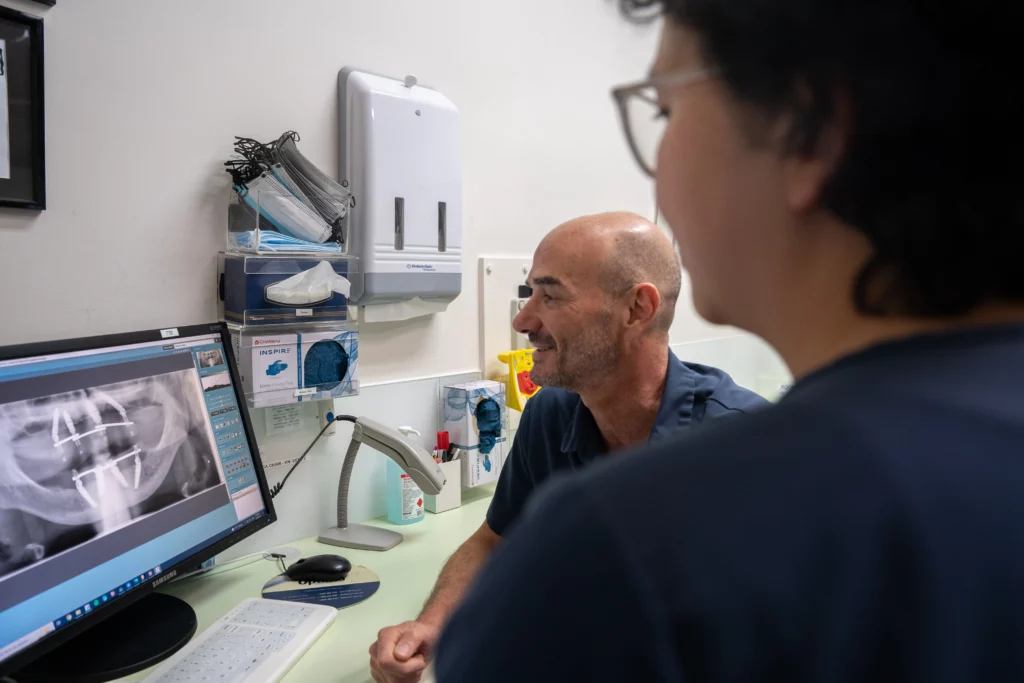Living with dental distress or gaps in your teeth can create discomfort while also denting your confidence. Thankfully, with a number of different options, dental implants can alleviate any issues and give you a lasting smile restoration.

What are dental implants?
A dental implant is a metal screw placed into the jaw where you are missing one or more natural tooth roots. Implants provide a stable fixture that a prosthetic tooth can be attached to. This replaces the appearance and function of the missing natural tooth. Over time, the implant screw has bone grow over it, helping to hold it firmly in place.
Dental implants are designed to be as permanent as possible by restoring the full anatomy of a missing tooth. Each full dental implant is composed of three main parts:
- Screw: This acts as the artificial root for your tooth replacement, and is secured in your jaw bone.
- Abutment: The metal connecting piece that attaches to the top of the screw and protrudes above the gum line.
- Crown: The false tooth itself. It is custom-made to match the colour of the rest of your teeth and is fitted onto the abutment.
Implants are predominantly made out of titanium, but other materials including ceramics may be used instead.
Different types of dental implants
Dental implant placement is complex, therefore different implant types are needed. People lose teeth in different areas of their mouths. Sometimes their gap is in one place, but gaps can also be spread throughout the teeth in multiple spots. To treat the full range of tooth loss, there are a variety of different dental implants.
Single and multiple dental implants
The most standard type of dental implants, a single implant involves placing a screw where a natural tooth root is missing, and then attaching a crown to the post to create an artificial tooth. Single dental implants mimic both the function and appearance of your natural teeth. They are one of the preferred tooth replacement options to treat a single gap in your teeth.
Multiple dental implants do the same job but in situations where you have multiple teeth missing in a row. When you have adjacent missing teeth, the gap can be filled either with individual crowns or a dental bridge. Dental bridges include multiple replacement teeth connected to each other to cover the full gap in your mouth. They are typically held in place by an implant at each end.
Full mouth implants
Full mouth dental implants — also known by the names All On 4, All On Implants, AO4, All On X and more — are used for a more total teeth replacement, when you have lost most or all of the teeth in your top or bottom jaw. They work by placing four titanium implants in either your upper or lower jaw, and then attaching a full arch of prosthetic teeth. Full mouth implants do a similar job to dentures, but are typically more permanent and not removable.

Zygomatic implants
The zygomatic bone forms the prominent part of the cheek. It can be used as a stable anchor for implants when patients are missing too much bone in their jaw. This may be a problem for patients who have many missing teeth or significant gum disease. Zygomatic dental implants extend past the jaw and sit in the cheekbone instead. This ensures that patients can still receive effective dental implant treatment even if they have decay in their jaw bone.
Implant-retained dentures
Traditional dentures are removable, which can lead to a lack of retention, looseness and painful movement. Instead, dentists can use implant-retained dentures. Multiple implants are placed in the jawbone and a denture-like plate or prosthesis is then secured to the implants. This removes the ability for the dentures to move around and creates a more secure replacement for missing teeth.
Who can receive dental implants?
Dental implants are a good replacement option when you have one or more missing teeth, which can create a variety of negative consequences for your oral health when they go untreated. Unfortunately, there are some cases where implants are not able to be placed. When you lose a tooth, your jawbone begins to deteriorate in that area. A good candidate must have healthy gums and enough stable bone in their jaw to support the implant.
Additionally, we only recommend receiving a dental implant if your jaw is fully grown. This means that we typically reserve the treatment for people who are 18 or older. Your dentist will be able to identify whether one or more dental implants would be viable to treat your missing teeth.
Are dental implants painful?
Implant surgery is performed with patients either under local or general anaesthesia, meaning that they do not feel the procedure taking place. This avoids pain during the surgery itself, but it is common to feel some discomfort or mild pain afterwards. Patients can usually take medication to manage their pain.
Are there any risks or side effects to dental implants?
As with any surgical procedure, dental implant treatment does carry some minor health risks. This includes injury to surrounding structures or sinus problems. However, these issues are usually resolved quite easily if they occur.
Another possible side effect of dental implants is infection. If pain lingers for longer than ten days, it can be a sign that the implant site has become infected. This can lead to a loss of the tooth replacement if not treated quickly. Your dentist will take you through all the risks before beginning any surgery, and help you to understand your decision.
Dental implant procedure
The dental implant procedure is typically completed in stages, which can take several months in total. Dental implants surgery begins with a full scan and x-ray of your mouth to give the dentist a thorough idea of how and where the implant will need to be placed. From there, the dental implant screw is placed in the jawbone and left to heal. In this time, your natural bone grows and secures around the implant post in a process known as osseointegration. This process is largely the same regardless of whether it is a single dental implant or full mouth dental implants.
When the implant is sufficiently stable in your jaw, your dentist will begin creating the replacement tooth or crown. The abutment is also attached to the implant post at this stage, and your gums are left to heal for around two weeks. After this, your dentist will use impressions of your mouth to create the replacement tooth or crown. Once ready, it is then screwed or cemented into the foundation.
How long do dental implants last?
Once a dental implant post is fused with your jawbone, it should last for the rest of your life. However, the dental crowns that are placed on your implant to replace your missing teeth will only last between five and fifteen years in most cases, after which they will need to be replaced. Thankfully, you will not need to undergo a full dental implant surgery at this point.
Dental implant aftercare
Though designed to be permanent, dental implants may not last if you do not look after your teeth and overall oral health. To ensure that your full dental implants last as long as possible, you should continue to brush at least twice a day, floss regularly and avoid overdoing it on sugary foods and drinks.
After having dental implants placed, patients will need to follow a liquid diet for the first two days, before slowly introducing soft foods that require little chewing. Patients should avoid tough, sticky or crunchy foods for between three and six months to ensure the dental implants stabilise properly. Your implant dentist will help you understand what soft foods to eat after dental implants are placed, and what you can and cannot eat through each stage of post-treatment care to avoid implant failure.
Other factors that may affect the longevity of your dental implants include teeth grinding, which can wear down your dental crowns faster, and heavy smoking, which not only deteriorates your crowns but leads to decay of your gums and jaw. This will ruin the stable connection between your implant and bone, while also having a host of negative ramifications for your remaining natural teeth.
How much do dental implants cost?
The cost of dental implants will depend on a number of factors, including how many you require, the level of decay you may have in your gums and bone, and how complex the procedure is likely to be. To help you understand your options, you can speak to our team who will provide their recommendation on the best treatment for you and how much that would cost.
Dental implants are typically an expensive procedure, but by providing a largely permanent solution to missing teeth, they can save you money in the long run if you maintain your oral health and replacement teeth.
Does health insurance cover dental implants?
The cost of your dental implants may be partially covered by your private health insurance, depending on your level of cover and what they include in coverage. If you are considering dental implants, we suggest contacting your health fund directly to find out whether they would be able to partially or fully cover the treatment.

Implants in Melbourne
CDIC is home to one of the formative and leading full mouth implant dentists in the country, Dr Hillel New. He was one of the first dentists in Australia trained to deliver All On 4 dental implants, and his expertise extends across all areas of implant surgery. He leads a team of dedicated, highly-trained and compassionate professionals excited to help you restore your smile. To start your own smile transformation, book an obligation-free consultation and we will help you understand whether dental implants are the right treatment for your needs. We can’t wait to see your new smile.



